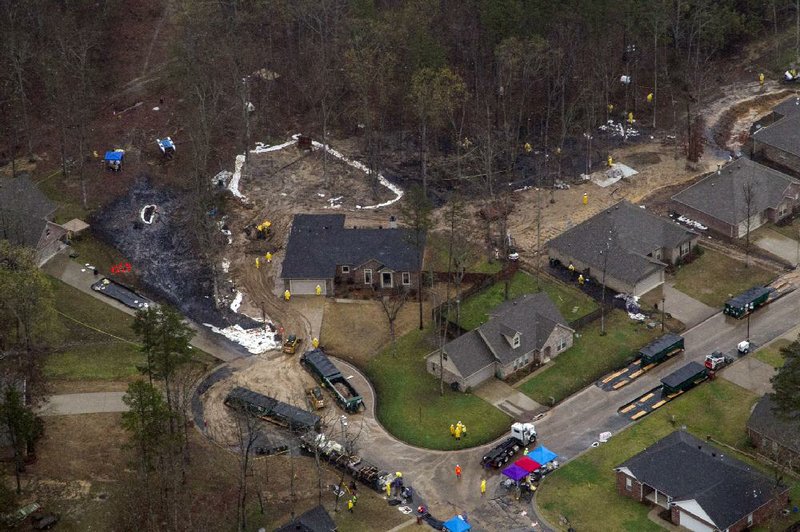More than three years after Exxon Mobil's Pegasus pipeline ruptured and spilled thousands of gallons of thick crude into a Mayflower neighborhood, the company has paid a $2.63 million fine, a federal regulatory spokesman said Wednesday.
Still, the wrangling between the oil giant and the federal Pipeline and Hazardous Materials Safety Administration may not be over. The company has 89 days from the date of the agency's final order of compliance -- April 1 -- to decide whether to challenge the far-reaching order in a federal appeals court.
"We continue to evaluate our options on the Final Order, including a possible appeal," Exxon Mobil spokesman Ashley Smith Alemayehu said in an email Wednesday.
The company paid the fine that totaled $2,630,400 on April 21, safety administration spokesman Damon Hill said in response to a question from the Arkansas Democrat-Gazette. The agency sometimes posts news releases and other information online about major developments in long-standing cases such as this one but has not reported the fine's payment.
Exxon Mobil had just 20 days to pay the fine or appeal. But federal regulations give such companies substantially more time to seek judicial review of agency action.
For a company as big as Exxon Mobil -- it has estimated its 2015 earnings at $16.2 billion compared with $32.5 billion in 2014 -- the order could prove far more significant than a fine that totaled $2,630,400.
The compliance order requires Exxon Mobil to modify its integrity management program to ensure that it adequately identifies risks and addresses all of the corporation's pre-1970 electric-resistance welded pipe, not just problems with the Pegasus pipeline.
Built in 1947-48, the Pegasus line and some other pre-1970 carriers used a type of pipe that is no longer manufactured and that the industry has known for decades has an increased risk of seam failure. The problems stemmed from manufacturing defects such as hook cracks -- which is what Exxon Mobil has said caused the Pegasus pipeline to crack open in Mayflower's Northwoods subdivision on March 29, 2013, Good Friday.
Exxon Mobil shut down the 861-mile pipeline -- running from Nederland, Texas to Patoka, Ill. -- shortly after the accident. Only a 211-mile stretch in Texas has resumed service.
Exxon Mobil has argued that the order is "overbroad and an abuse of discretion" because some of its provisions apply to pipelines other than the Pegasus. The federal regulatory agency has countered that it has the authority to order compliance with integrity-management regulations. As part of the compliance order, the agency also instructed Exxon Mobil to provide documentation once it has completed the required safety actions.
Among the safety administration's findings in the case was one that the oil company failed to establish a continual assessment schedule for the Pegasus based on its risk factors.
If Exxon Mobil takes its case to court, it likely will ask the court to stay, or delay, implementation of the compliance order pending a ruling in the case.
Among the order's requirements is one that within 30 days of its issuance, subsidiary Exxon Mobil Pipeline Co. must submit to the agency a spreadsheet identifying all pre-1970 electric-resistance welded pipe covered by its integrity management program. Further safety measures are required thereafter.
The underground Pegasus pipeline runs through about 13.5 miles of Lake Maumelle's watershed -- a concern for Central Arkansas Water, the utility that oversees the lake, which provides drinking water to more than 400,000 central Arkansans.
Richard Kuprewicz, a pipeline safety consultant who has been advising Central Arkansas Water, said Wednesday that he believed the safety administration was "dead on" in its concerns about risks on other "vintage" pipelines operated by Exxon Mobil.
The agency's view was that if Exxon Mobil "didn't handle it [integrity management] well here on this pipeline, and if you've got it on other pipelines, you've also got to" take care of them, Kuprewicz said.
"I get what [the agency] is saying and fully support it," he said.
In Mayflower, the ruptured pipeline sent tens of thousands of gallons of heavy crude into the Northwoods subdivision, drainage ditches and a cove of Lake Conway.
Twenty-two houses were evacuated, some for months. Some residents never moved back, and three of the houses were demolished. Exxon Mobil has told federal authorities that the accident caused $57 million in property damage.
A Section on 04/28/2016
